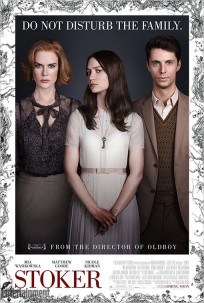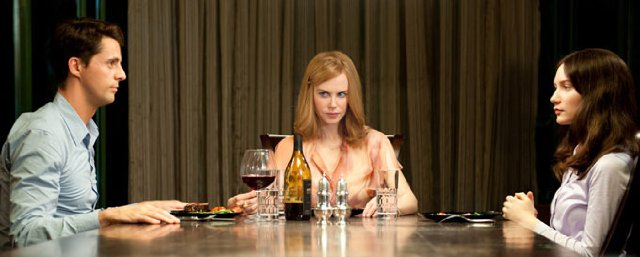
| Release Date: | March 1st, 2013 |
| Starring: | Mia Wasikowska, Matthew Goode, Nicole Kidman, Dermot Mulroney, Jacki Weaver, Lucas Till |
| Writer: | Wentworth Miller |
| MPAA Rating: | R |
| Director: | Chan-wook Park |

The Stoker family’s patriarch (Dermot Mulroney) has died under curious circumstances, leaving behind his virginal, morbid 17-year-old daughter India (Mia Wasikowska) and her bewitched, bitchy mother Evelyn (Nicole Kidman) in their New England manse to play out a relationship that is a hybrid of Shirley Jackson and V.C. Andrews. Spiders crawl along walls of Lynchian dark crimson draped by heavy black curtains in a feat of spook house art direction that gives the Stoker’s house of secrets a distinct dread of impending violence. India comes from a line of curious, gothic wisps from Lewis Carroll’s Alice to Delia in Beetlejuice; she’s bored and wants to scare herself and also find out what really happened to her father.
[springboard type=”video” id=”677021″ player=”cnim002″ width=”560″ height=”315″ ]
That impending violence comes in the form of an “Uncle Charlie” (Matthew Goode) to rival Joseph Cotton’s bluebeard in Hitchcock’s Shadow of a Doubt. In that 1943 classic, “Uncle Charlie” brings his cold brand of murder to the leafy peace of the suburbs with a particularly unnerving interest in his teenage niece. Stoker’s handsome, young “Uncle Charlie” has come home from extensive travels to assert himself as head of the household, seducing and scaring in equal measure with piercing eyes and icy command. India, at first repulsed, grows attracted to her uncle’s penchant for strangling interlopers with her father’s belt, opening a floodgate of Freudian interpretations that will make this a satisfying second viewing. Not much is left unrevealed about the mysterious boxes of saddle shoes India has received anonymously at every birthday or what is hiding in the Stoker’s dark, breathing cellar, but Park knows to leave just enough room for our own game-playing.

Nicole Kidman, Matthew Goode, and Mia Wasikowska in “Stoker.”
Stoker flirts with being a cult classic but misses the mark by working too hard to explain itself and by tempering the more grotesque, drastic elements that the director would likely have not resisted in his homeland. I was surprised by how tamely Stoker plays its violent shock moments since Park has never shied from making an audience squirm, but plays up the psychological with rapturous sequences like an erotic piano duet between India and Charlie (or maybe just her idea of her sophisticated uncle) and a climactic scene between mother and daughter highlighting Park’s flair for tightly-confined domestic horror (check out the apartment scenes near the end of his odd vampire movie Thirst). Maybe the director who made his Oldboy leading man consume a live octopus on-screen for our gross-out pleasure has decided to take the gentler approach to gain a larger viewership. Cultists will call him a sell-out but Director Park remains true to himself with the artful, off-kilter Stoker.[box_info]WHERE TO WATCH (powered by JustWatch)
[/box_info]


TheVern
I agree that the movie is a lot more tamer then his earlier ones. But for a U.S. audience who don’t know about his other works. This will still disturb them. Great post